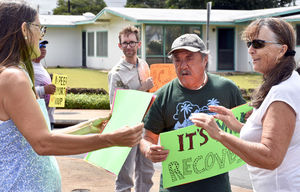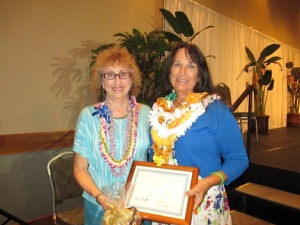Let’s Overcome Fears and Tackle Mental Illness
Posted: Tuesday, December 27, 2016 12:05 am
Recently, I taught my last class, in a series of 12, of National Alliance on Mental Illness Family to Family education class. During the wrap up, one of my students asked me why more people don’t sign up for the class. He is a local man, and said this was such fantastic knowledge for his family who is dealing with a son who suffers from a mental illness.
I had to tell him I honestly don’t know why. I have been teaching this class for four years. I am on the mayor’s committee for Equal Access, I participate with a booth at Tropic Care Kauai, I have been on Kong Radio, Ho’eke TV, and participated in the county wellness program and many health fairs across the island. I have taught mental health first aid to the Maui and Kauai police recruits.
His question really made me think.
Just why is it that our community has not welcomed this free class to help families deal with a loved one who has a mental illness? Class 11 talked about stigma, and I believe that is why there is not greater participation.
We are an island of many cultures, though we are one people. Many of our cultures believe that matters such as these should be kept in the family. There is shame still associated with having a mental illness. We need to wake up, people!
Our schools are such a mess that we can’t fully staff them with permanent teachers. Many substitute teachers have become permanent teachers. There are discipline problems in our schools at every level. Many times mental illness is mistaken for behavior problems. We have one of the highest suicide rates among students in the nation. It’s time we faced these issues head on. Mental illness knows no bounds.
We have every right to ask why this sort of prejudice still prevails and why, among many other serious illnesses, mental illness should be singled out for such a history of heartless social disregard.
It is inconceivable that Americans stricken with heart disease, diabetes, arthritis, or cancer would tolerate this degree of discrimination when seeking help for their medical problems. Why should this deplorable situation exist for people with brain disorders?
Why for instance, have we not seen breakthroughs in psychiatric disorders comparable to those which expanded our compassionate understanding of other serious physical conditions?
Few of us recall when parents of developmentally disabled children were accused of ignoring their “slow” children and thereby causing their handicap. These dreadful myths have been exposed by scientific research, public education and organized protest.
But why not mental illness? The reason is stigma. However, the stigma attached to mental illness in our culture is particularly severe and carries with it a chilling, social judgment. Society still widely believes that people with mental illness, and their families, are to blame for their condition. Science has proven time and again that this is not true.
Genetics, environment, alcohol and drugs are contributory factors for mental illness.
If you have a family member suffering from mental illness, you are not alone. Our NAMI Kauai Family will be gathering for our monthly support group from 6 to 7:30 p.m. Wednesday. If you want to learn more about how to deal with issues the family encounters having a loved one with a mental illness, you are invited to participate in our support group.
It has been my goal, since achieving “affiliation” status under the NAMI Hawaii state charter, to bring this information to our island.
I trained support group facilitators so that we could have groups on the West/South/Lihue side, as well as the North Shore. Unfortunately, after a training weekend in Honolulu, our two candidates chose not to become support group facilitators. If you have interest in becoming a support group leader for Kapaa/North Shore, please contact me, as NAMI Hawaii is planning another training next year.
The island is coming together to address the alcohol and drug use issues of our Keiki. It’s time to also take a good, hard look at the lack of services and coordination of mental health services for them and their families.
For more information on NAMI, please call Kathy Sheffield at 635-3239 or email at [email protected]. Kathy is available for presentations to groups, schools, interested parents, churches and first responders. Have a wonderful holiday season, and empathy for those stiff suffering from mental illness.
•••
Kathy Sheffield is founder and president of NAMI Kauai.
NAMI Applauds Passage of H.R. 2646, the Helping Families in Mental Health Crisis Act
Ending the stigma
Kathy Sheffield, Karin Dameron, Mark Bagaoisan, Marc Sicignano and Kurt Nagata, supporters of NAMI, hold signs to bring awareness about mental health Wednesday during a sign-waving campaign at the Hardy Street roundabout in Lihue.
Kurt Nagata of Friendship House gets a sign from Karin Dameron and Kathy Sheffield of NAMI as Mark Bagaoisan and Marc Sicignano look on Wednesday during a sign-waving campaign at the Hardy Street roundabout in Lihue.
A motorcyclist passes Kurt Nagata of Friendship House, Kathy Sheffield, Karin Dameron and Mark Bagaoisan of the NAMI group, Wednesday during a sign-waving campaign to raise awareness about mental health at the Hardy Street roundabout in Lihue.
LIHUE — Kurt Nagata of Friendship House said he has been granted more years to live because of recovery.
“I still suffer, but life has a lot to offer, and now, I’m busy with life,” he said Wednesday.
Nagata started recovery when he was just 16 years old.
“I have schizophrenia, I was in substance abuse recovery programs,” he said. “I’m now 58 years old. That’s a lot of medication over the years. I’ve been there, done that. Now, I live life on life’s terms.”
Nagata was one of a handful of people waving signs at the Hardy Street roundabout to raise awareness about mental health during Mental Health Week.
Signs read, “Stamp Out Stigma,” “You R not alone,” and “Have Mo-Betta Life.” A few passersby honked and waved back.
“The month of May is Mental Health Month with a theme of ‘Life with a Mental Illness.’ Who knows this?” said Kathy Sheffield of the National Alliance on Mental Illness Kauai. “We are holding signs so at least the motorists passing will become awareness of mental health and what NAMI Kauai can do to help recover from mental health disorders.”
A peer support group is being formed for people 18 years and older to help recover from mental illness. The first meetings is scheduled 4 p.m. June 8 at Hospice Kauai.
“Now, we have a peer support group which is badly needed here on Kauai,” Sheffield said. “Mental illness recovery involves the whole family.”
NAMI Kauai recently received a grant to teach first responders how to handle people who have symptoms of mental health disorders.
Why You Should Stop Using the Phrase ‘the Mentally Ill’

(Photo: morkeman/© morkeman)
By Tanya Basu
Google the phrase “mentally ill” and you’ll find the following: “Mentally Ill Man’s Shooting Fits Troubling Pattern.” “Solitary Confinement Out for Mentally Ill?” “Chicago Police to Receive New Training on How to Assist Mentally Ill.”
And so on. There’s a potentially troubling subtext to these headlines, in that it makes “the mentally ill” sound like a separate subset of the population. The fact is, however, that mental illness — which is itself a huge umbrella covering everything from depression to schizophrenia to bipolar disorder and more — affects one in five American adults (or more than 43 million people 18 and over), according to the National Alliance on Mental Illness. Now new research makes the case that simply using the phrase “the mentally ill” may be inadvertently promoting a dangerous level of intolerance.
Related: A First-Person Account of a Psychotic Episode
Darcy Haag Granello and Todd A. Gibbs at the Ohio State University just released a paper in The Journal of Counseling & Development looking at this issue. They took more than 600 people — undergraduate students, adults, and counselors-in-training — and used the Community Attitudes Towards the Mentally Ill (CAMI) survey. The one twist: Half of the respondents got statements associated with “the mentally ill,” and the other half got the exact same statements with “people with mental illnesses” instead. When the phrase “the mentally ill” was used, different groups showed different levels of intolerance. College students are more likely to believe that people with mental illnesses should be controlled and isolated. Adults, on the other hand, are less empathetic or “benevolent” to those suffering from mental illness and are more likely to want to have them separated from the “normal” community.
What’s most surprising is the reaction that counselors have when the phrase “the mentally ill” is used: They’re more likely to believe that those suffering from mental illness should be controlled and isolated from the rest of the community. That’s pretty surprising, given that these counselors are perhaps the ones most likely to be aware of the special needs and varying differences in diagnoses of the group.
Counselors also showed the largest differences in how intolerant they were based on the language, which boosted the researchers’ belief that simply changing language is important in not only understanding people who suffer from mental illness but also helping them adjust and cope. “Even counselors who work every day with people who have mental illness can be affected by language,” Granello said in a press release. “They need to be aware of how language might influence their decision-making when they work with clients.”
Related: How Anxiety Can Make You Smarter
The concept of changing the way we refer to people with mental illnesses dates back to the “person-first” (sometimes referred to as “people-first”) movement of the 1990s, when advocates argued that defining a person by their disability robbed them of their personhood and their identity. “When you say ‘people with mental illness,’ you are emphasizing that they aren’t defined solely by their disability,” Gibbs said. “But when you talk about ‘the mentally ill’ the disability is the entire definition of the person.” Despite the “person-first” movement of the 1990s, Granello and Gibbs’s study is the first one to look at how language affects how we perceive this population.
Granello is hesitant to say that a conclusion can be drawn from this, that it was too early to draw definitive conclusions about how different populations responded to the phrase “the mentally ill.” The study participants were mostly white Americans; race might have a huge factor to play. And the authors note that gender could also play a role in a person’s conception of another person with mental illness.
That said, a simple change in our language, while admittedly “cumbersome,” is something that is important to not only give people with mental illness recognition of the fact that they are more than their condition, but also a way to help them integrate into society. “The important point to take away is that no one, at least in our study, was immune,” Granello said in the news release, pointing to how counselors too showed levels of intolerance. “All showed some evidence of being affected by the language used to describe people with mental illness.”
Outstanding Family Advocate / The Garden Island
Mental Health America of Hawaii Awards Luncheon
Kathy Sheffield of Kalaheo was recently honored by Mental Health America of Hawaii as “Outstanding Family Advocate” for the State of Hawaii. She traveled to Oahu to receive the honor at the annual Mahalo Awards Luncheon, held at the Ala Moana Hotel, Honolulu. She was nominated by the Executive Director and Treasurer of NAMI Hawaii for the honor. Kathy is the founder and program director of NAMI Kauai, which became an affiliate of NAMI Hawaii in September of 2014.
For over 70 years, Mental Health America of Hawaii has been Hawaii’s leading mental health education and advocacy program. They educate and organize the community to enhance mental wellness for all Hawaii people. Through their leadership, they expand mental health awareness, understanding, and action. They advocate to ensure that people with mental health problems have the quality services they deserve.
Kathy was additionally presented citations at the luncheon by the Hawaii State Legislature and Senator Brian Schatz, for her volunteer work as a Family Advocate in raising awareness of mental health issues and reducing the stigma attached to this disease.
Kathy serves as a family advocate in the Kauai Court System, is a NAMI Family-to-Family Certified Teacher, and a certified NAMI Support Group Facilitator. More information about NAMI programs can be found on the internet at NAMI Kauai.
Picture:
Kathy Sheffield receives “Outstanding Family Advocate of Hawaii” award from Marya Gambs, Executive Director, Mental Health America of Hawaii.
7 Mental Illness Myths People Still Believe
Can we all just stop?
Mental illness stigma can lead to a multitude of false beliefs — and it’s about time to set the record straight. Negative stereotypes create a lot of misconceptions, which further alienate people in a community that already feels isolated.
The many fallacies that surround mental health disorders can make managing them all the more difficult — after all, research suggests stigma acts as a barrier to treatment. Below are just a few of the myths no one should believe about mental illness.

Myth 1: It’s contagious.
To bust this myth, it’s important to understand the difference between feelings and mental health disorders. Mental illness sufferers experience a spectrum of emotions, but this is a byproduct of brain chemistry and other possible factors that led to a diagnosis.
Though studies suggest that emotions — particularly stressful ones — are contagious, mental illness is not. It does not operate the same as the cold or flu, circulating through a scientific process of spreading germs.
Despite this knowledge, many people still believe mental illness can be spread. A 2014 paper published in the journal Memory & Cognition found that people believe mental illness can be communicable from one person to another. This belief is unfounded and most certainly false, not to mention it could also lead to feelings of isolation for those who have mental illness.
Myth 2: Mental illness is an indication of violence.
Many people still blame mental illness for horrific tragedies like the recent shooting of two journalists in Virginia, perpetuating a stigma that’s not easy to shed. But here’s the reality: A mental health disorder does not mean that someone is going to commit a violent act. In fact, a 2014 study found that people with mental health issues are more likely to be victims of violent crimes than the ones committing them.
Myth 3: It’s uncommon.
Wrong. Approximately one in four people worldwide will experience a mental health issue at some point in their life. That makes it very likely that someone you know will suffer from a psychological disorder.
Myth 4: Mental illness is “all in your head.”
There’s still a common belief in society that someone with anxiety can “just calm down” or someone with depression can “snap out of it,” as if they can choose to have an episode come or go. That’s simply not true. There are very real physical symptoms. Someone who suffers from depression may see changes in appetite, headaches and indigestion and someone who experiences anxiety may endure cardiovascular problems, stomach issues and a weakened immune system.
Myth 5: You can’t recover from mental health issues.
Mental illness isn’t one-size-fits-all, which means treatment varies for everyone. Therapy, medications and outside support are all useful tools in managing a mental health disorder and helping an individual lead a healthy and productive life.
“Depression is a treatable disorder,” HuffPost’s mental health editor Lloyd Sederer, the medical director of the New York State Office of Mental Health, wrote in a blog last year. “Like any serious illness, it takes comprehensive, ongoing, scientifically based care, an effective working patient-clinician relationship, and the support and patience of loving others.”
Myth 6: Mental illness stems from a bad childhood.
Life circumstances certainly can play a role, but other factors also have an influence on mental health disorders. Take anxiety, for example: “It’s not that having a difficult childhood is completely unrelated, but having a difficult childhood can be related to all kinds of things, not just anxiety,” Joseph Bienvenu, an associate professor of psychiatry and behavioral sciences at Johns Hopkins University, previously told HuffPost. “Some people have great childhood and still have anxiety.”
Research suggests that some mental health disorders may be caused by chemical imbalances in the body. Seasonal Affective Disorder, which affects nearly 10 million people at certain points of the year, fluctuates based on seasonal changes.
Myth 7: You can’t help someone suffering from a mental health disorder.
Loved ones are paramount in helping someone with a mental illness get treatment. According to a recent nationwide mental health analysis, social support plays a large role when it comes to intervening or preventing suicide.
“It requires a little reflection and thought to be supportive,” Gregory Dalack, chair of the department of psychiatry at the University of Michigan, previously told HuffPost. “Family members, friends and significant others have an opportunity to help in a way that’s not judgmental — even if it’s just helping them get to appointments, take medications or stick to a daily routine.”
NAMI-Kauai Family-to-Family Class Participants

These NAMI Kauai participants recently completed the 12-week Family-to-Family course. In front, from left, are Donna Jo George, Sola Radiance, Karin Medigovich, Diana Leone, Kauai NAMI program coordinator Kathleen Sheffield and Maria Gutierrez. In back are Susan O’Neill and Inayat Hertsun.
LIHUE — Kauai is now an affiliate of the Hawaii chapter of the National Alliance on Mental Illness.
Local volunteers celebrated last Sunday at Ha Coffee Bar in Lihue. The achievement comes after forming in March 2013, with Kauai joining the Big Island and Maui as three affiliate islands with the state chapter on Oahu, and more than 1,000 local and state affiliate NAMI groups around the country.
“Being an affiliate allows us to grow and expand as services are needed, and tailor them to our community,” said Kathleen Sheffield, Kauai NAMI program coordinator.
Affiliates have access to NAMI national research, programs and teaching materials. They become part of the NAMI lobby in advocating for services and legislation to benefit those with mental illness and their families.
“Supporting, educating and removing stigma from those who have a mentally ill member of the family is crucial in healing the whole family unit, so that recovery is possible,” Sheffield said.
NAMI is a national grassroots organization dedicated to improving the lives of people affected by mental illness, and their loved ones who care for them. It works to improve the quality of life for parents, spouses, siblings and adult offspring of people who suffer from mental illness, and to provide a forum to better cope and understand their loved ones.
NAMI classes on Kauai started with Family-to-Family, a free 12-week course to help family and friends of individuals with serious mental illness learn to cope with the emotional overload of being a caregiver.
Karin Medigovich said NAMI is an excellent organization that made a difference for her, both as a student and certified teacher.
“It is amazing in terms of educating family and friends and even professionals, on what it takes to deal with mental illness and to be better advocates,” Medigovich said.
Donna Jo George of Kapaa recently completed her certified teacher training to become a volunteer. George, who retired years ago, moved to Kauai and took the class after struggling to care for a loved one with a brain disorder.
“It was invaluable because by getting more knowledge I could become more empathic and compassionate for people with mental illness and brain disorders,” George said.
The education was free and George said she learned more about herself and the attitudes that she held for years. In her experience, someone with mental illness might share that they are on medication, but really could not or would not talk about anything else.
NAMI supports efforts for more inpatient beds that treat people in crisis and aftercare, as well as transitional group homes. They also advocate for mentally ill defendants in the judicial system.
Cheryl Sakamoto, a former program director at NAMI Hawaii in Honolulu, joined to seek information and support for an adult son on Molokai.
The attitudes on mental health are moving away from stigma, Sakamoto said. In her role at NAMI, she assisted the Kauai efforts. Less than two years later, the chapter is now an affiliate.
“This is a very significant milestone,” Sakamoto said. “I couldn’t speak higher about Kathy Sheffield for all the effort she has made for the people in Kauai, for those living with a mental illness, as well as the family members who must adjust to the challenges of their loved one with a mental illness.”
Troy Freitas, acting manager for Kauai Community Mental Health and acting administrator for statewide Community Mental Health Centers under the Hawaii Department of Health, said he is a strong supporter of NAMI Hawaii, both as an advocate for mental health in the state Legislature and as a partner in improving services.
“This affiliation status on Kauai is a signal to me that they will have a stronger presence there and that can only help us help consumers and their families in their recovery better than we are already able to do,” said Freitas.
For information about Kauai NAMI classes or programs, contact Sheffield at [email protected] or call 635-3239.




